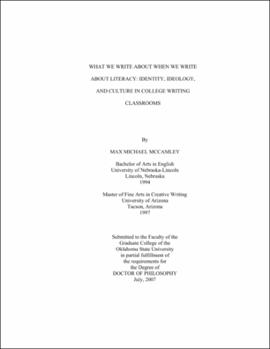| dc.contributor.advisor | Batteiger, Richard P. | |
| dc.contributor.author | McCamley, Max Michael | |
| dc.date.accessioned | 2013-11-26T08:29:34Z | |
| dc.date.available | 2013-11-26T08:29:34Z | |
| dc.date.issued | 2007-07 | |
| dc.identifier.uri | https://hdl.handle.net/11244/7076 | |
| dc.description.abstract | Scope and Method of Study: This study examines the writing of 30 students in two writing classes at Oklahoma State University to determine the cultural forces behind their literacy practices. | |
| dc.description.abstract | Findings and Conclusions: For the first-year writing students, parents and family stand out as the predominant literacy sponsors for these students, but very few teachers do. In addition, the questionnaires were often more revealing than the literacy narratives in essay form. In fact, the students consciously constructed the narratives to establish often archetypal identities for themselves as devotees of literacy. The students' writing reveals a remarkable rhetorical dexterity and ideological flexibility as they interrogate and challenge beliefs, attitudes, and ideologies about literacy while still professing their allegiance to it. The creative writing students' memories confirm many of the sponsorship and literacy accumulations of the first-year writing students, but they also reveal the compulsions many students feel to compartmentalize and prioritize their literacy choices through a complex method of resource allocation. The students' reading journals revealed an intricate accession and resistance to the disciplinary motivations of the assignment. While some students used the journals to learn how to "read like a writer," many students also used the journal to further their cultural literacy, and still others harnessed the journals and their reading to investigate issues from their lives of particular import to them. This research suggests that if educators are "conflicted brokers" of literacy, then students are conflicted buyers, and these conflicts need to be addressed so that real literacy learning can take place. I conclude the study by suggesting its implications for teaching and proposing new avenues of research. | |
| dc.format | application/pdf | |
| dc.language | en_US | |
| dc.rights | Copyright is held by the author who has granted the Oklahoma State University Library the non-exclusive right to share this material in its institutional repository. Contact Digital Library Services at lib-dls@okstate.edu or 405-744-9161 for the permission policy on the use, reproduction or distribution of this material. | |
| dc.title | What we write about when we write about literacy: Identity, ideology, and culture in college writing classrooms | |
| dc.contributor.committeeMember | Brooks, Ronald C., Jr. | |
| dc.contributor.committeeMember | Walker, Jeffrey | |
| dc.contributor.committeeMember | Belmonte, Laura A. | |
| osu.filename | Mccamley_okstate_0664D_2358.pdf | |
| osu.accesstype | Open Access | |
| dc.type.genre | Dissertation | |
| dc.type.material | Text | |
| dc.subject.keywords | literacy | |
| dc.subject.keywords | college | |
| dc.subject.keywords | economics | |
| dc.subject.keywords | identity | |
| dc.subject.keywords | ideology | |
| dc.subject.keywords | culture | |
| thesis.degree.discipline | English | |
| thesis.degree.grantor | Oklahoma State University | |
